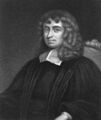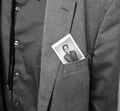|
|
| (20 intermediate revisions by the same user not shown) |
| Line 1: |
Line 1: |
| <gallery> | | <gallery> |
|
| |
|
| ||1615: Adriaan van Roomen dies ... priest and mathematician.
| | File:Isaac Barrow.jpg|link=Isaac Barrow (nonfiction)|1677: Mathematician and theologian [[Isaac Barrow (nonfiction)|Isaac Barrow]] dies. Barrow played an early role in the development of infinitesimal calculus: he was the first to calculate the tangents of the kappa curve. |
| | |
| ||1626: Dutch explorer Peter Minuit arrives in New Netherland (present day Manhattan Island) aboard the See Meeuw.
| |
| | |
| ||1655: Bartolomeo Cristofori born ... instrument maker, invented the piano.
| |
| | |
| ||1675: King Charles II of England orders the construction of the Royal Greenwich Observatory.
| |
| | |
| File:Isaac Barrow.jpg|link=Isaac Barrow (nonfiction)|1677: Mathematician and theologian [[Isaac Barrow (nonfiction)|Isaac Barrow]] dies. He played an early role in the development of infinitesimal calculus. | |
| | |
| File:Huygens sketches of Death.jpg|1680: Steganographic analysis of sketches by [[Christiaan Huygens (nonfiction)|Huygens]] for a projection of Death taking off his head, an early example of [[Phantasmagoria (nonfiction)|Phantasmagoria]], reveals "several hundred uinits" of unencrypted data. (The archaic term "uinit" is thought to roughly correspond with a kilobyte.)
| |
| | |
| ||1726L Major-General William Roy born ... Scottish military engineer, surveyor, and antiquarian. He was an innovator who applied new scientific discoveries and newly emerging technologies to the accurate geodetic mapping of Great Britain.
| |
|
| |
|
| File:Jean Charles Borda.jpg|link=Jean-Charles de Borda (nonfiction)|1733: Mathematician, physicist, and sailor [[Jean-Charles de Borda (nonfiction)|Jean-Charles de Borda]] born. He will contribute to the development of the metric system, constructing a platinum standard meter, the basis of metric distance measurement. | | File:Jean Charles Borda.jpg|link=Jean-Charles de Borda (nonfiction)|1733: Mathematician, physicist, and sailor [[Jean-Charles de Borda (nonfiction)|Jean-Charles de Borda]] born. He will contribute to the development of the metric system, constructing a platinum standard meter, the basis of metric distance measurement. |
|
| |
| ||1777: Louis Jacques Thénard born ... chemist.
| |
|
| |
|
| File:Thomas Henry Huxley.jpg|link=Thomas Henry Huxley (nonfiction)|1825: Biologist [[Thomas Henry Huxley (nonfiction)|Thomas Henry Huxley]] born. He will be known as "Darwin's Bulldog" for his advocacy of Charles Darwin's theory of evolution. | | File:Thomas Henry Huxley.jpg|link=Thomas Henry Huxley (nonfiction)|1825: Biologist [[Thomas Henry Huxley (nonfiction)|Thomas Henry Huxley]] born. He will be known as "Darwin's Bulldog" for his advocacy of Charles Darwin's theory of evolution. |
|
| |
| File:The_Eel.jpg|link=The Eel|1839: Mathematician, art critic, and alleged time-traveller [[The Eel]] teams up with mathematician and criminologist [[Joseph Diez Gergonne (nonfiction)|Joseph Diez Gergonne]]. Working together, they will develop a new theory of projective geometry which detects and prevents shape theft and several other types of [[crimes against mathematical constants]].
| |
|
| |
| ||1845: William Kingdon Clifford born ... mathematician and philosopher. Building on the work of Hermann Grassmann, he introduced what is now termed geometric algebra, a special case of the Clifford algebra named in his honor. Clifford was the first to suggest that gravitation might be a manifestation of an underlying geometry. Pic.
| |
|
| |
|
| File:Joseph_Diez_Gergonne.jpg|link=Joseph Diez Gergonne (nonfiction)|1859: Mathematician and logician [[Joseph Diez Gergonne (nonfiction)|Joseph Diez Gergonne]] dies. He contributed to the principle of duality in projective geometry, by noticing that every theorem in the plane connecting points and lines corresponds to another theorem in which points and lines are interchanged, provided that the theorem embodied no metrical notions. | | File:Joseph_Diez_Gergonne.jpg|link=Joseph Diez Gergonne (nonfiction)|1859: Mathematician and logician [[Joseph Diez Gergonne (nonfiction)|Joseph Diez Gergonne]] dies. He contributed to the principle of duality in projective geometry, by noticing that every theorem in the plane connecting points and lines corresponds to another theorem in which points and lines are interchanged, provided that the theorem embodied no metrical notions. |
|
| |
| File:USS Cairo.jpg|link=USS Cairo (nonfiction)|1860: [[USS Cairo (nonfiction)|USS Cairo]] retrofitted with military [[Gnomon algorithm functions]] for use in fighting [[crimes against mathematical constants]].
| |
|
| |
| ||1879: William Froude dies ... engineer, hydrodynamicist and naval architect. He was the first to formulate reliable laws for the resistance that water offers to ships (such as the hull speed equation) and for predicting their stability. Pic.
| |
|
| |
| ||1879: Leonid Isaakovich Mandelstam born ... physicist.
| |
|
| |
| ||1886: Haymarket affair: A bomb is thrown at policemen trying to break up a labor rally in Chicago, United States, killing eight and wounding 60. The police fire into the crowd.
| |
|
| |
| ||1902: Carl Henry Eckart born ... physicist, physical oceanographer, geophysicist, and administrator. He co-developed the Wigner–Eckart theorem and is also known for the Eckart conditions in quantum mechanics,and the Eckart–Young theorem in linear algebra. Pic.
| |
|
| |
|
| File:Harry Daghlian.gif|link=Harry Daghlian (nonfiction)|1921: Physicist [[Harry Daghlian (nonfiction)|Harry Daghlian]] born. He will be fatally irradiated in a criticality accident during an experiment with the Demon core at Los Alamos National Laboratory. | | File:Harry Daghlian.gif|link=Harry Daghlian (nonfiction)|1921: Physicist [[Harry Daghlian (nonfiction)|Harry Daghlian]] born. He will be fatally irradiated in a criticality accident during an experiment with the Demon core at Los Alamos National Laboratory. |
|
| |
|
| ||1924: Lucien de la Rive dies ... physicist. He studied electromagnetism and wrote an early article on the Theory of relativity.
| | File:Karl Jones photo by Steve Ozone.jpg|link=Karl Jones (nonfiction)|2019: Photograph of [[Karl Jones (nonfiction)|Karl Jones]] taken by Steve Ozone. |
| | |
| ||1932: In Atlanta, mobster Al Capone begins serving an eleven-year prison sentence for tax evasion.
| |
| | |
| ||1932: Edward Nelson born ... professor in the Mathematics Department at Princeton University. He was known for his work on mathematical physics and mathematical logic. In mathematical logic, he was noted especially for his internal set theory, and views on ultrafinitism and the consistency of arithmetic.
| |
| | |
| File:Alice Beta Paragliding.jpg|link=Alice Beta Paragliding|1943: ''[[Alice Beta Paragliding]]'' published. Many experts believe that the illustration depicts Beta infiltrating the [[ENIAC (SETI)|ENIAC]] program, although this is widely debated. | |
| | |
| ||1961: Malcolm Ross and Victor Prather attain a new altitude record for manned balloon flight ascending in the Strato-Lab V open gondola to 113,740 feet (34.67 km).
| |
| | |
| ||1970: Vietnam War: Kent State shootings: The Ohio National Guard, sent to Kent State University after disturbances in the city of Kent the weekend before, opens fire killing four unarmed students and wounding nine others. The students were protesting the Cambodian Campaign of the United States and South Vietnam.
| |
| | |
| ||1974: Otto Marcin Nikodym dies ... mathematician. He worked in a wide range of areas, but his best-known early work was his contribution to the development of the Lebesgue–Radon–Nikodym integral (see Radon–Nikodym theorem). Pic.
| |
| | |
| ||1988: The PEPCON disaster rocks Henderson, Nevada, as tons of Space Shuttle fuel detonate during a fire.
| |
| | |
| ||1989: Iran–Contra affair: Former White House aide Oliver North is convicted of three crimes and acquitted of nine other charges; the convictions are later overturned on appeal.
| |
| | |
| ||1972: Edward Calvin Kendall dies ... chemist and academic, Nobel Prize laureate.
| |
| | |
| ||1974: William Maurice "Doc" Ewing dies ... geophysicist and oceanographer.
| |
| | |
| ||1922: Alexander Randolph born ... designer of board games and writer. Randolph's game creations include TwixT, Breakthru, Inkognito (with Leo Colovini), Raj, Ricochet Robot, and Enchanted Forest (with Michael Matschoss).
| |
| | |
| ||1998: A federal judge in Sacramento, California, gives "Unabomber" Theodore Kaczynski four life sentences plus 30 years after Kaczynski accepts a plea agreement sparing him from the death penalty.
| |
| | |
| ||2000: Hendrik Casimir dies ... physicist and academic ... best known for his research on the two-fluid model of superconductors (together with C. J. Gorter) in 1934 and the Casimir effect (together with D. Polder) in 1948.
| |
| | |
| ||2000: Aleksander Ilyich Akhiezer dies ... theoretical physicist, known for contributions to numerous branches of theoretical physics, including quantum electrodynamics, nuclear physics, solid state physics, quantum field theory, and the theory of plasma.
| |
| | |
| ||2013: Christian de Duve dies ... cytologist and biochemist, Nobel Prize laureate.
| |
| | |
| ||2014: Edgar Cortright dies ... scientist and engineer.
| |
| | |
| ||2014: Helga Königsdorf dies ... physicist and author.
| |
| | |
| File:Fire Dance.jpg|link=Fire Dance (nonfiction)|2018: Signed first edition of ''[[Fire Dance (nonfiction)|Fire Dance]]'' spontaneously bursts into flames during steganographic analysis. Despite extensive damage from fire and smoke, almost all of the data from the image will be recovered.
| |
|
| |
|
| </gallery> | | </gallery> |





